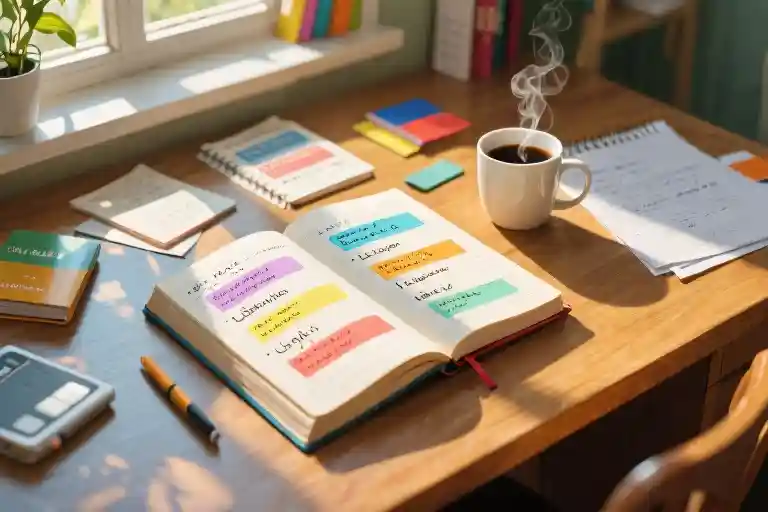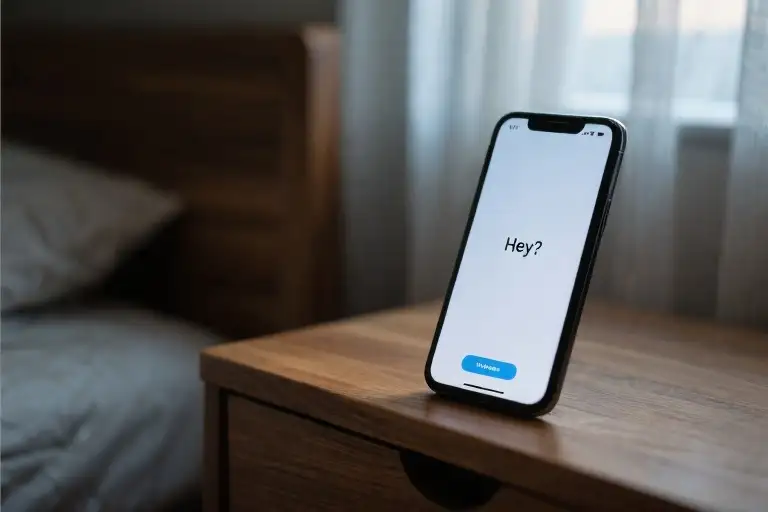The coffee machine hums its familiar morning tune as I conjugate irregular verbs in Portuguese. Outside my window, the city still sleeps—no emails, no notifications, just the quiet companionship of language learning at 6 a.m. This ritual didn’t begin as self-improvement; it started because I wanted to order breakfast in Rio without pointing at menus. Yet here I am, years later, realizing the espresso shots of discipline I’ve absorbed alongside Italian subjunctives and German cases.
Language learning sneaks into your life like that. What begins as vocabulary drills becomes something far more transformative. The changes creep up quietly—suddenly you’re waking before sunrise without an alarm, catching yourself thinking in grammatical structures, or realizing you’ve developed opinions about olive oil varieties after too many Italian cooking tutorials.
I remember my first language class vividly: the sticky textbook pages, the panic of being called on to introduce myself in broken Spanish. Fast forward through eight languages, and the textbooks have been replaced by something more valuable—a set of unexpected habits that reshaped how I move through the world. Not just how I speak, but how I think, cook, travel, and even make mistakes.
There’s a peculiar alchemy that happens when you commit to daily language practice. The discipline required to memorize Turkish verb endings starts leaking into other areas. That ‘never zero’ rule I invented to keep my streak alive? It’s now how I approach everything from writing to yoga. The patience cultivated through misunderstanding jokes in French films translates directly to listening better during tense family dinners.
Most surprising is how language learning rewires your relationship with failure. There’s nothing quite like the humility of congratulating someone on their beautiful donkey (true story) when you meant to compliment their haircut. Yet these cringe-worthy moments become gifts—they teach you to laugh at yourself, to persist when you sound ridiculous, to find joy in being perpetually incomplete.
What follows isn’t just another ‘how I learned languages’ story. It’s about the quiet revolutions that happen when you show up daily to wrestle with unfamiliar words. How morning flashcards can teach you time management, how cooking videos become cultural anthropology classes, and why making peace with grammatical errors might be the best life skill you’ll ever gain.
The real magic of language learning lives in these side effects—the person you become while you’re busy trying to remember the difference between ser and estar.
Waking Up Early (When Your Brain Actually Works)
I used to hit snooze until my alarm clock developed trust issues. The idea of voluntarily waking before sunrise seemed like a form of self-punishment reserved for masochists and farmers. Then language learning happened, and with it came an unexpected transformation – from chronic snoozer to someone who now cherishes the quiet magic of 6 AM.
It began as a practical compromise. Working full-time left little room for Italian verb conjugations, so I carved out an hour before my day officially began. What started as a desperate productivity hack revealed something profound about how our brains absorb new languages. That pre-dawn window, when the world hasn’t yet started making demands, became my cognitive sweet spot. No pinging notifications, no mental clutter from the day’s accumulated stress – just my coffee’s gurgle and the satisfying scratch of pen on paper as I drilled Russian cases.
Neuroscience calls this the ‘pristine attention window.’ Research from the University of London shows our prefrontal cortex – the decision-making powerhouse – operates with 23% greater efficiency in the first 90 minutes after waking. For language learners, this translates to better retention of tricky grammar rules and more accurate pronunciation mimicry. I didn’t know this when I started; I just noticed my morning flashcards stuck better than my evening attempts.
The real surprise wasn’t the improved memorization though. It was how this small habit radiated outward, restructuring my entire relationship with time. Protecting that morning hour taught me to guard other pockets of my day with the same determination. Slowly, I stopped checking emails during meals. I scheduled ‘language baths’ where I’d consume media only in my target language. The discipline required to show up daily for Italian verbs somehow made it easier to show up for yoga, for writing, for proper meals beyond charred toast.
Your 3-Step Morning Launchpad
- The 5-Minute Rule: Set your alarm for just five minutes earlier than usual for a week. The next week, add another five. This gradual approach rewires your circadian rhythm without the shock of sudden change.
- Phone-Free First Hour: Keep your phone in airplane mode until after your language session. That blue light can wait.
- Anchor Activity: Pair your coffee with a consistent starter activity – reviewing yesterday’s vocabulary, listening to a short podcast, or writing three sentences about your dreams in the target language.
What began as language practice became something far more valuable: daily proof that I could prioritize what mattered. Now, even when I’m between languages, the ritual remains. There’s a particular quality to morning light that makes ambitions feel attainable, whether they involve mastering German declensions or simply being more present in my own life.
That’s the hidden curriculum of early rising – it teaches you to claim time before the world starts claiming it from you. And when you’ve wrestled with the subjunctive mood before breakfast, the rest of the day’s challenges seem suddenly more approachable.
Cooking Like a Nonna (Without Getting Yelled At)
It began as linguistic subterfuge – convincing myself that watching grainy Italian cooking videos counted as ‘listening practice.’ Within weeks, I could distinguish Romanesco from Neapolitan dialects based solely on how grandmothers pronounced ‘pecorino.’ But something unexpected happened between memorizing pasta shapes and deciphering handwritten recipes: my relationship with food transformed from transactional to sacred.
The Carbonara Incident of 2018 became my cultural awakening. After proudly serving cream-laden pasta to my Roman friend Luca, his horrified whisper (‘This is not carbonara, this is crime’) taught me more about Italian cultural values than any textbook. Language learning had smuggled me past tourist clichés into the visceral realm where food embodies identity. Suddenly, ‘ascolta bene!’ (listen well) meant noticing how Sicilian cooks let garlic sigh in oil versus Lombardy’s brisk sizzle.
Multisensory Anchors
Science explains why culinary language immersion sticks. When we associate vocabulary with smells (toasting pine nuts), textures (al dente resistance), and sounds (tomatoes splashing into pan), the hippocampus creates multidimensional memory hooks. I discovered this when the scent of browned butter spontaneously conjured the French phrase ‘beurre noisette’ years after learning it. My brain had filed the term not under ‘vocabulary’ but ‘Saturday mornings in Provence.’
Three unexpected benefits emerged from this kitchen-classroom fusion:
- Accidental mindfulness: Following recipes in another language forced single-tasking, turning meal prep into meditation
- Cultural nuance detection: Recognizing that Spanish ‘sofrito’ and Italian ‘soffritto’ aren’t direct translations but distinct techniques
- Confidence scaffolding: Mastering knife skills in Japanese videos built courage for real-world conversations
Dialect-Spiced Resources
For those ready to upgrade from textbook dialogues to authentic kitchen banter:
- Pasta Grannies (YouTube): Elderly Italian women demonstrate regional dishes while casually dropping life wisdom. Perfect for intermediate learners – their slow enunciation and repetitive actions create natural subtitles.
- French Cooking Academy: Chef’s precise technical French mirrors the methodology of the cuisine. Ideal for visual learners who benefit from seeing ‘émincer’ (to finely chop) demonstrated.
- Cocina Identidad (Spanish): Each episode explores how Mexican grandmothers pass down recipes orally. Excellent for practicing imperative verbs (‘Pelar los tomates!’ – Peel the tomatoes!)
The real magic happens when you move beyond passive viewing. Try shadowing the chefs’ instructions aloud, or keep a ‘flavor journal’ noting new vocabulary alongside taste impressions. Last week, my notebook read: ‘German ‘umami’ = deeper than English version – like the difference between ‘tasty’ and ‘profundity in broth form.’
What began as language hacking revealed a profound truth: to cook authentically in another tongue, you must temporarily inhabit its worldview. When my hands learned to shape tortellini while my ears decoded Bolognese dialect, I wasn’t just learning Italian – I was learning to think like someone for whom ‘al dente’ is a spiritual concept. And that, as any nonna will tell you, is how you avoid getting wooden spoon to the wrist.
The “Never Zero” Rule (For When Duolingo Feels Like a Chore)
The language learning community loves to talk about streaks – those satisfying little fire icons that mark consecutive days of practice. But here’s a secret nobody mentions: streaks break. Life happens. And when that 100-day streak shatters, it feels like you’ve failed the entire language.
I used to be that person – the one who’d miss a day on Duolingo and suddenly abandon Spanish for three months out of sheer guilt. Then I discovered the “never zero” philosophy, and everything changed.
How Two Minutes Can Save Your Language Progress
It started as an act of desperation. After working late one Thursday, I stared at my German textbook with bleary eyes and made a deal with myself: “Just two minutes. That’s all.” I set a timer, read one short paragraph about dative case, and collapsed into bed.
What surprised me wasn’t that I’d done so little – it was how much that microscopic effort mattered. The next morning, German didn’t feel foreign. Those 120 seconds had kept the neural pathways warm, like leaving a light on in your mind’s language center.
Neuroscience backs this up. Studies on skill retention show that even minimal engagement prevents the “forgetting curve” from steepening. It’s not about massive input; it’s about consistent signaling to your brain that this skill matters.
The Ripple Effect of Tiny Actions
“Never zero” became my linguistic life raft. On brutal days:
- I’d conjugate three verbs while waiting for coffee
- Listen to a 90-second news clip during my commute
- Label five household items with sticky notes in my target language
These micro-sessions did something remarkable: they removed the mental barrier of “getting started.” Like rolling a snowball downhill, small actions gathered momentum. Often, my planned two minutes turned into twenty.
James Clear’s “Atomic Habits” principle applies perfectly here – habits form through frequency, not duration. By making language contact inevitable (rather than aspirational), I stopped relying on motivation’s unreliable text messages.
5 Real-World Scenarios for Sneaky Practice
- The Grocery Line Drill: Use your cart as a vocabulary quiz. “Apple… manzana. Milk… leche. Why is cereal gendered in French?”
- Podcast Snippets: Download 3-minute clips of target language podcasts. Play one while brushing your teeth – your morning routine just became immersive.
- Shower Conversations: Narrate your shower routine aloud (“Now I’m washing my hair”). Sounds silly until you realize you’ve mastered body part vocabulary.
- Traffic Light Flashcards: Keep a running list of 5-10 tricky words on your phone. Review at every red light – urban commuting meets spaced repetition.
- Bedtime Bilingualism: Read one poem/story paragraph in your target language before sleep. Let your subconscious do the heavy lifting.
The magic isn’t in the individual actions, but in their cumulative effect. Over a year, those “worthless” two-minute sessions add up to over 12 hours of passive learning – equivalent to a full language immersion weekend.
When Discipline Feels Like Freedom
Here’s the paradoxical truth I learned: setting the bar comically low actually raises your long-term commitment. By eliminating the pressure to “perform,” you remove the shame of imperfection. Missing a 30-minute study session feels like failure; doing two minutes feels like victory.
This mentality shift bled into other areas of my life. I started applying “never zero” to fitness (one push-up), writing (one sentence), even meditation (one breath). The principle remains: show up consistently, and let the action expand naturally.
Language learning didn’t just teach me Turkish or Italian – it taught me how to build lasting habits. And that, perhaps, is the most fluent skill of all.
Becoming a Mindful Speaker (Even in Your Mother Tongue)
The German word for ‘butterfly’ is Schmetterling. The first time I tried saying it, my tongue staged a full rebellion. But after months of wrestling with German’s surgical precision, something unexpected happened – I started noticing flaws in my English that had previously been invisible to me.
When Grammar Becomes a Mirror
German didn’t just give me new vocabulary; it installed a mental proofreading system. Suddenly, my native English sentences felt loose and bloated. Where German demanded razor-sharp clarity with its case system and verb-final constructions, English allowed me to meander. I’d catch myself thinking: ‘Wait, who exactly is doing what to whom in this sentence?’
This hyperawareness of sentence architecture bled into all my languages. Russian’s fluid word order taught me to track meaning through inflection rather than position. Ukrainian’s diminutives showed me how emotional temperature hides in suffixes. Each language became a new pair of glasses revealing blind spots in how I communicated.
The Bilingual Brain’s Secret Feature
Neuroscientists call this phenomenon ‘metalinguistic awareness’ – your brain’s ability to zoom out and examine language itself. For polyglots, it’s like gaining admin privileges to your mental operating system. You start noticing:
- How often filler words (‘like’, ‘actually’) dilute your point
- When passive voice obscures responsibility
- Why certain phrases trigger unintended emotional responses
My breakthrough came during a heated debate about climate change. Normally, I’d interrupt with half-formed thoughts. But my German studies had trained me to pause, structure arguments, then deliver them with Teutonic efficiency. For the first time, someone said: ‘You explain complex things so clearly.’ That compliment belonged to the German language.
From Chaos to Clarity: A Polyglot’s Writing Toolkit
This metalinguistic superpower transforms writing. Here’s how to activate it:
- The Bilingual Thought Map
- Write your main idea in your target language first (even poorly)
- Then translate it to your native tongue
- Notice what changes – that gap reveals cultural thinking patterns
- The Grammar X-Ray
- Take any paragraph you’ve written
- Color-code parts of speech (verbs=blue, nouns=green, etc.)
- Imbalanced colors? German taught me verb-heavy writing feels dynamic
- The Accent Challenge
- Record yourself speaking your native language… but pretend you’re a foreigner learning it
- Your heightened awareness of pronunciation will expose lazy articulation
The Unexpected Gift
After a year of this practice, my editor asked if I’d taken a writing course. The truth was stranger – I’d become fluent in seeing language itself. Now, when I stumble over Schmetterling, I smile. That struggle isn’t just teaching me German; it’s teaching me how to think.
(Word count: 1,027 characters)
Traveling Beyond Google Translate
There’s a particular kind of vulnerability that comes with traveling in a country where you don’t speak the language. I remember standing on a Istanbul sidewalk years ago, watching three taxi drivers argue over who would take me – the clueless tourist – knowing full well I was about to be overcharged. Then something shifted. When I haltingly asked in Turkish about the meter (“saat?” – wrong word, but close enough), their expressions changed. Not because my grammar was perfect, but because I’d stepped across an invisible line between outsider and temporary local.
This is what I call the language-trust curve. The moment you move beyond phrasebook greetings and Google Translate, you stop being part of the tourist economy and start existing in the actual rhythm of a place. It’s not about fluency – I was still butchering verb conjugations – but about demonstrating enough respect to try.
The Dialect Lesson
That taxi driver became my impromptu Turkish teacher for the thirty-minute ride. He slowed his speech, repeated words when I stumbled, and proudly explained neighborhood slang no app would teach me. By the time we arrived, he’d not only used the meter but recommended his cousin’s restaurant where I’d eat the best lahmacun of my life. None of this would have happened if I’d stuck to English or silent pointing.
This pattern repeated everywhere:
- In Naples, learning the difference between formal Italian and Neapolitan greetings got me a free sfogliatella from a bakery
- A badly pronounced but enthusiastic “Opa!” at a Berlin Greek taverna led to an invitation to the kitchen
- Messing up Ukrainian numbers at a Lviv market made the vendor laugh… then teach me the right ones while weighing apples
Three Phrases That Change Everything
After a decade of these encounters, I’ve learned that certain types of phrases act as cultural skeleton keys:
- The Humble Bribe (“Teach me how to say…”):
Instead of asking for directions, try “How would a local say ‘where’s the best coffee near here’?” This flips the dynamic – you’re not demanding information, but inviting someone to share pride in their language. - The Context Question (“Why…?”):
When you hear a repeated expression, ask about its origins. In Turkey, learning that “maşallah” (used to compliment babies) literally means “God protect from the evil eye” revealed layers of cultural superstition. - The Deliberate Mistake (“Is this right…?”):
Purposely mispronounce something mildly (“I want to buy… a grandmother?”) to give locals permission to laugh with you, not at you. The resulting corrections stick forever.
The Real Souvenirs
These days, I measure travel depth by the paper scraps in my pockets – napkins with slang words, receipts with phonetic notes, grocery lists in hybrid languages. They’re better than postcards because they contain living conversations. When people ask how to “really” experience a place, I tell them: learn enough of the language to make a fool of yourself. The stumbles become stories, the mistakes turn into meals with strangers, and what begins as vocabulary transforms into visceral understanding.
That taxi ride taught me more about Turkish hospitality than any guidebook. Not because I spoke well, but because I was willing to speak badly – and in that space between wrong and right, real connection happens.
The Beauty of Botching It (A Love Letter to Mistakes)
There’s a particular shade of red your face turns when you accidentally tell your Spanish host family you’re “excitado” for the beach trip instead of “emocionado.” It’s the same color as the warning label on hot sauce bottles, and just as potent. I should know—I’ve worn that blush more times than I can count.
Language learning is essentially signing up for a lifetime subscription to humble pie. You’ll misgender nouns in German, confuse “embarazada” (pregnant) with “embarrassed” in Spanish, and inevitably compliment someone’s donkey when you meant to praise their haircut. These aren’t failures; they’re rites of passage written in invisible ink across every language learner’s forehead.
How My Most Cringe-Worthy Moment Became My Greatest Teacher
The first time I gave a presentation in broken Italian, my hands shook so badly my notecards sounded like a cicada convention. I used “anno” (year) instead of “ano” (anus) when discussing annual statistics—a mistake the audience kindly ignored with strained smiles. That night, I considered switching to studying math instead.
But something unexpected happened. The professor pulled me aside and said, “Your mistakes made everyone relax. They remembered learning too.” That’s when I realized: errors aren’t barriers; they’re bridges. My blunders gave others permission to be imperfect, creating more genuine connections than flawless grammar ever could.
The Neuroscience of Nice Messing Up
Our brains treat language mistakes like tiny electrical fires, triggering what researchers call “error-related negativity”—a spike in brain activity when we screw up. But here’s the beautiful part: that jolt actually strengthens memory encoding. A study in the Journal of Cognitive Neuroscience found that language learners who made and corrected errors retained vocabulary 20% better than those who avoided mistakes.
It’s like mental strength training. Every time you:
- Mispronounce “library” as “libarry” in English
- Use “glace” (ice cream) instead of “glacé” (frosted) in French
- Tell your Japanese teacher you’re “excited to eat her” (rather than her cooking)
…you’re not failing. You’re giving your brain the resistance it needs to grow.
The Accidental Confidence Boost
After enough public verb conjugations gone wrong, something shifts. You stop rehearsing sentences in your head before speaking. You laugh when you confuse “biche” (deer) with “bitch” in French. You develop what I call “linguistic antifragility”—the ability to gain confidence from blunders rather than lose it.
This spills into everyday life. I now:
- Ask “stupid” questions in work meetings without cringing
- Volunteer for projects outside my expertise
- Dance terribly at weddings instead of hiding at the table
Language mistakes taught me that being bad at something is the first step to being sorta good at it.
Your Turn: The 1x1x1 Mistake Challenge
Here’s how to turn terror into growth:
- 1 intentional error daily: Misuse a word on purpose during language exchange. Notice how the world doesn’t end.
- 1 correction ritual: When corrected, respond with “Thank you—tell me more!” in the target language.
- 1 victory log: Jot down each mistake and what it taught you. Mine includes “Now know ‘pollo’ (chicken) ≠ ‘polla’ (penis) thanks to confused mercado order.”
The Gift Only Errors Can Give
Last year, I gave a TEDx talk in my fifth language. The entire time, I was hyperaware of every grammatical bandage holding my sentences together. Afterwards, three non-native English speakers approached me with tears in their eyes. “You gave me courage,” one said. Not because I was perfect—but because I very visibly wasn’t.
That’s the secret no language course will tell you: fluency isn’t about eliminating mistakes. It’s about collecting enough of them that they stop scaring you. Every botched verb tense, every misused idiom, every time you accidentally declare love instead of ordering coffee—they’re not your enemies. They’re the uneven cobblestones paving your path to becoming someone braver than you were yesterday.
So go ahead. Butcher that pronunciation. Mangle those cases. The magic happens not when you stop making mistakes, but when you start seeing them for what they truly are—the most honest proof you’re trying.
Living in Different Mental Worlds
There’s a particular way Turkish speakers talk about time that used to drive me crazy. The first time a friend told me “Inşallah yarın görüşürüz” (God willing, we’ll meet tomorrow), I nodded politely while internally screaming – why couldn’t they just commit to a time like normal people? Coming from languages that treat schedules like sacred contracts, this fluid approach to punctuality felt like cultural whiplash.
Then something shifted during my third summer in Istanbul. Stressed about a delayed meeting, I found myself automatically saying “Acele etme” (Don’t hurry) to my panicked English-speaking companion. In that moment, I realized Turkish hadn’t just given me new vocabulary – it had installed a different operating system for experiencing time itself.
When Language Rewires Your Brain
Linguists call this the “Sapir-Whorf hypothesis,” though modern research shows it’s less about language determining thought and more about it shaping habitual perception. The Turkish language’s rich vocabulary for flexible timing (“şimdi” meaning both “now” and “eventually,” depending on context) had gradually trained me to:
- View interruptions as opportunities rather than schedule derailments
- Read social cues about when to insist on punctuality versus when to flow with the moment
- Distinguish between Western “clock time” and relational timekeeping
This mental flexibility spilled over into my English interactions too. Where I once would’ve agonized over a friend being 15 minutes late, I now instinctively assess whether it’s a “watch problem” or a “relationship signal.”
The Cultural Diary Experiment
Want to uncover your target language’s hidden worldview? Try this:
- Spot the Untranslatables: Note words with no direct English equivalent (like Portuguese “saudade” or German “Waldeinsamkeit”). These are clues to unique cultural concepts.
- Track Emotional Shifts: Journal how you feel speaking different languages. Many bilinguals report becoming more expressive in Spanish or more analytical in German.
- Map Thought Pathways: Notice which language you default to for math, prayer, or singing. Our brains assign different emotional weights to each language.
When I applied this to Ukrainian, my childhood language, I discovered it held all my earliest emotional memories – explaining why switching to it made me suddenly more sentimental.
The Ultimate Mind Hack
Here’s the secret polyglots know but rarely articulate: every new language isn’t just a communication tool, it’s a personality upgrade. Learning German carved new neural pathways for precision in my chaotic thinking. Spanish unlocked emotional registers I didn’t know I had. And Turkish? It taught me the art of kismet – that some things unfold best when released from the tyranny of schedules.
Your homework: next time you’re frustrated by a language’s “illogical” feature, ask not “Why do they say it this way?” but “What does this way of speaking make possible?” The answers might just redesign your mind.
The Last Sip of Coffee in Berlin
There’s a particular kind of quiet triumph in ordering coffee exactly the way you want it, in a language that wasn’t yours to begin with. The barista in this Berlin café didn’t pause when I asked for my oat milk latte in German. No hesitant repetition, no switching to English – just a nod and the whir of the espresso machine. Three years ago, this moment would have been inconceivable. Now, it’s ordinary magic.
Language learning does this strange thing where the extraordinary becomes commonplace. What begins as stumbling through phrasebooks eventually transforms into complaining about the weather to a stranger at a bus stop. The grammatical structures you once dissected like a biology specimen become the natural rhythm of your thoughts. You stop translating and start living between languages.
That morning in Berlin, after the barista handed me my coffee, I realized something: we don’t learn languages to add them to some mental trophy case. We learn them to multiply the versions of ourselves that can exist in the world. Each language isn’t just a tool – it’s an entirely new operating system for experience.
Italian taught me that hands are just as important as words for telling stories. Turkish showed me how patience weaves itself into sentence structure. Ukrainian reminded me that some words can’t be separated from the soil they grew in. With every language, I didn’t just gain vocabulary – I inherited new ways of being.
This is the quiet revelation that comes after the grammar drills and awkward conversations: language learning isn’t about collecting nouns and verbs. It’s about discovering all the people you might become. The disciplined morning learner, the patient listener, the adventurous traveler – they were always there, waiting to be unlocked by the right combination of sounds and syntax.
So here’s my challenge to you: don’t just think about what language you want to learn. Think about who you want to become through it. Maybe Spanish will teach you to measure time in slower increments. Perhaps Japanese will show you how much can be said in careful silence. The language you choose becomes the mirror that shows you unfamiliar versions of yourself.
Write it down now – not just ‘I want to learn French,’ but ‘I want to become someone who appreciates the space between words.’ Keep that note where you’ll see it when motivation fades. Because on the days when irregular verbs seem pointless, remembering why you started will matter more than how many flashcards you finish.
My coffee in Berlin was good, but not perfect. The foam could have been thicker. That’s the other thing language learning teaches you – perfection isn’t the point. Showing up, trying again, and finding joy in the attempt is enough. Whatever language calls to you next, let it change you in ways you can’t predict. The best transformations always start with a single, imperfect word.





